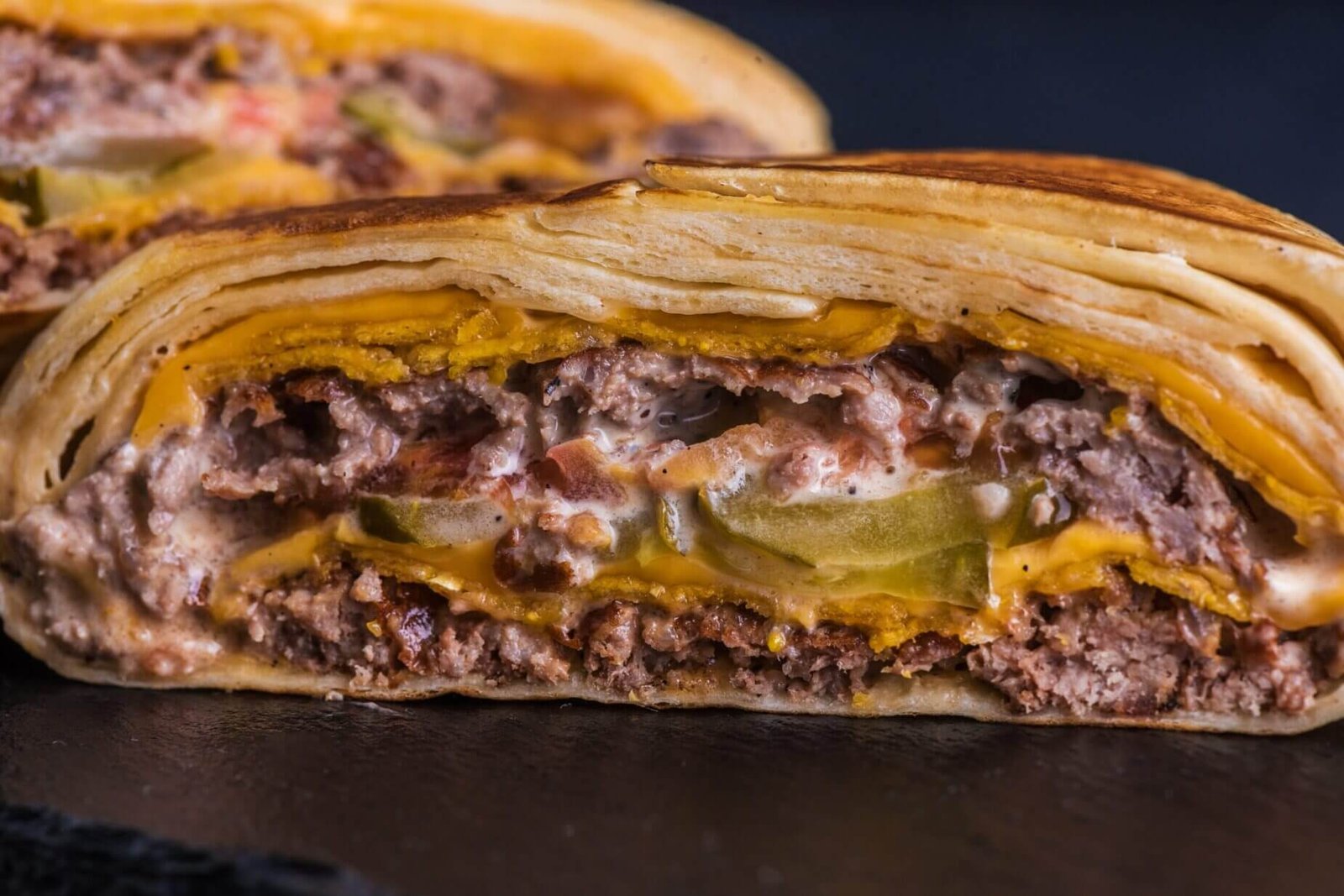The soft hum of the dehydrator running in the kitchen. It’s a sound that promises delicious snack-time bliss.

Making your own turkey jerky is very satisfying. It’s great for outdoor adventures or just enjoying tasty snacks.
Homemade jerky connects you to a long tradition. It gives you a sense of accomplishment and peace of mind. With just 1 pound of lean ground beef, 3 tablespoons of water, and patience, you can make perfect jerky. It’s seasoned just right and dried at 200°F for 4 hours.
Each bite of homemade turkey jerky is satisfying. It’s a low-calorie, high-protein snack. It has about 58 calories, 4 grams of protein, and only 15 mg of sodium per serving. The rich, smoky flavor is amazing.
Why not join me on this culinary journey? Let’s make homemade turkey jerky together. This easy recipe will help you, whether you’re a seasoned cook or a kitchen newbie. You’ll learn how to pick the right turkey cuts and get that perfect texture and taste. Get ready for a rewarding experience with every bite.
Introduction to Homemade Turkey Jerky
Making turkey jerky at home is a great choice for a healthier snack. It’s full of protein and low in fat. This means you get a tasty snack that’s also good for you.

You can make turkey jerky two ways: with a dehydrator or an oven. Each way has its own benefits. Choose based on what you have and how much time you have.
It’s important to pick lean turkey, like breast. This makes the jerky both tasty and healthy.
Make sure to cut the turkey meat evenly. This is between ⅛ inch and ¼ inch thick. This helps it dry evenly, so it’s not too dry or too wet.
The marinade is key to making the jerky taste great. You can find many recipes online. They range from spicy to low-sodium.
Making turkey jerky is fun because you can get creative. Try different marinades and spices to find your favorite. Plus, you avoid preservatives found in store-bought jerky.
Whether you use a dehydrator or an oven, making jerky is easy. Just remember to follow food safety rules. With the right steps, you’ll have delicious, homemade turkey jerky.
Why Choose Turkey for Jerky?
Turkey is a great choice for making jerky. It has less fat than other meats. This makes your jerky tasty but also healthier.
Turkey is also very high in protein. Jerky has always been a good source of protein. It was used by the Quecha Indians and later by Spanish Conquistadors.
Turkey takes in flavors well. Recipes use soy sauce, garlic, and black pepper. This makes each bite full of flavor.

Commercial jerky is often softer. But, making your own keeps it chewy like the old days. Use a pellet smoker or dehydrator to get it right.
Turkey is good for jerky because it’s healthy and absorbs flavors well. Try a turkey jerky recipe for a tasty and nutritious snack.
Ingredients Needed for Your Turkey Jerky
Making great turkey jerky begins with the right ingredients. You’ll also want some optional extras to make it even better. Here’s a list to help you get started.
The Essentials
The heart of any turkey jerky recipe is the turkey itself. Here’s what you need:
- Lean Turkey Slices: Choose lean cuts for less fat. You’ll need 2-3 pounds.
- Soy Sauce: It’s a key part of the marinade. Look at the sodium levels: San-J has 940 mg/tbsp, La Choy has 1330 mg/tbsp.
- Worcestershire Sauce: It adds a rich flavor.
- Honey: It sweetens the marinade a bit.
- Garlic Powder and Onion Powder: These spices give a full taste.
- Black Pepper and Paprika: They add a nice spice.
- Salt: It’s used for flavor and to keep the meat fresh, but use it carefully because of the soy sauce.
Optional Add-ins
Want to make your turkey jerky even more special? Try these optional ingredients:
- Crushed Red Pepper: It adds a spicy kick for those who like it hot.
- Liquid Smoke: It gives the jerky a smoky taste, like smoked meats.
- Brown Sugar: It brings a different sweetness, with a hint of molasses.
- Cayenne Pepper: For a bold, intense heat.
Preparing the Turkey Meat
To make great turkey jerky, start with the right turkey meat. Follow these steps to pick the best cuts and slice them right. This way, you’ll get tasty, even jerky every time.
Selecting the Perfect Cut
Picking the right turkey cut is key. Go for the breast because it’s lean and low in fat. This makes the jerky healthy and flavorful.
When slicing turkey for jerky, make sure the slices are thin and even. This helps the jerky dry well. Breast meat works best for this because it dries evenly.
Proper Slicing Techniques
Getting uniform slices is important for drying. Here are some tips for slicing right:
- Partial Freezing: Freeze the turkey a bit before slicing. This makes it easier to slice.
- Sharp Knife or Meat Slicer: Use a sharp knife or meat slicer for thin, even strips. Aim for ⅛ to ¼ inch thickness. A meat slicer helps you get even slices.
- Consistent Slices: Try to make all slices the same size. This ensures they dry evenly, so none gets too dry or too wet.
By following these steps, you’ll make delicious turkey jerky. It will be perfectly textured and safe to eat.
Creating the Marinade for Maximum Flavor
Making the perfect marinade is key to making your turkey jerky taste great. You can choose from classic, spicy, or low-sodium flavors. Here are some recipes to start with.
Basic Marinade Recipe
For a classic taste, mix these ingredients:
- ½ cup soy sauce
- ¼ cup Worcestershire sauce
- 1 teaspoon garlic powder
- 1 teaspoon onion powder
Let the turkey strips soak in the flavors for at least 6 hours or overnight. This will make them taste the best.
Spicy Variations
For a spicy turkey jerky recipe, add these to your basic marinade:
- 1 teaspoon cayenne pepper
- 2 diced jalapeños
This mix will make your jerky very spicy. It’s perfect for those who love spicy food.
Low-Sodium Options
For a low-sodium turkey jerky, use low-sodium soy sauce and skip the salt:
- ½ cup low-sodium soy sauce
- ¼ cup Worcestershire sauce (optional, use coconut aminos for extra flavor)
| Ingredient | Quantity | Purpose |
|---|---|---|
| Soy Sauce | ½ cup | Main flavor base |
| Worcestershire Sauce | ¼ cup | Enhances umami |
| Garlic Powder | 1 teaspoon | Adds depth |
| Onion Powder | 1 teaspoon | Enhances savory flavor |
| Cayenne Pepper (optional for spicy) | 1 teaspoon | Adds heat |
| Diced Jalapeños (optional for spicy) | 2 pieces | Intensifies spice |
| Low-Sodium Soy Sauce (low-sodium option) | ½ cup | Reduces sodium content |
By mixing and matching these, you can make a marinade that fits your taste and diet. Every bite will be full of flavor.
Marinating Time for Best Results
Getting the best flavor from turkey jerky starts with the right marinating time. You want the meat to soak up all the marinade’s flavors. For the best taste, marinate your turkey slices in the fridge for at least 6 hours.
But, for even more flavor, let it marinate overnight. This way, the meat absorbs all the yummy flavors.
Here’s a look at how marinating times differ for beef and turkey jerky:
| Jerky Type | Minimum Marinating Time | Ideal Marinating Time |
|---|---|---|
| Beef Jerky | 12 hours | 48 hours |
| Turkey Jerky | 6 hours | Overnight |
Make sure your turkey jerky has enough time in the marinade. This ensures a deep, savory flavor. The longer it marinates, the better it tastes.
Marinating turkey jerky is a key step. Don’t rush it. Patience here means better taste and quality. Use these tips to make your turkey jerky the best it can be.
Using a Dehydrator vs. Oven for Drying
There are two main ways to dry turkey jerky at home. You can use a dehydrator or dry it in the oven. Each method has its own benefits. You can pick what works best for you based on what you have and what you like.
Dehydrator Instructions
Many people like using a dehydrator for making jerky. First, set your dehydrator to 160°F. Then, put the marinated turkey strips on the trays without overlapping them. This helps dry the meat evenly.
Drying time can be between 4 to 6 hours. A dehydrator helps make the meat flavor stronger by removing moisture well.
Oven Instructions
If you don’t have a dehydrator, you can dry turkey jerky in the oven. Start by heating your oven to 175°F. Place the turkey strips on a wire rack over a baking sheet. This helps air move around the meat.
Let the jerky dry for about 4 hours. Flip the strips halfway to dry them evenly. You want the jerky to be dry but chewy.
It’s important to keep things clean when handling raw meat. This helps prevent contamination and keeps your food safe. For more tips, see this detailed turkey jerky recipe.
Ensuring Food Safety When Making Jerky
When making homemade turkey jerky, keeping it safe is key. Always heat the meat to 160°F before drying. This step kills harmful bacteria, making the jerky safe to eat.
Use a meat thermometer to check the meat’s temperature. Keep the drying area at 165°F or higher. This is important for food safety. Also, keep the jerky dry to stop bacteria from growing.
To keep your jerky fresh, use good packaging and storage. Vacuum-sealed containers are best because they keep air out. Store the jerky in a cool, dry place. Here’s how to store it right:
| Storage Method | Duration |
|---|---|
| Room Temperature | 1-2 weeks in a sealed container |
| Refrigerated | 3-6 months |
| Frozen | Up to 1 year |
Preservatives like sodium nitrite help stop bacteria. You can also use vinegar or lemon juice for a natural option. But remember, the high sodium in jerky helps keep it safe and tasty.
Watch for signs of spoilage like mold, bad smells, and weird textures. Spoiled jerky can make you sick. So, always follow food safety rules when making jerky.
Testing Your Turkey Jerky for Doneness
It’s very important to make sure your turkey jerky is just right. Knowing how to test turkey jerky helps you get the best taste and safety. You’ll learn about the signs to look for and how to check the texture and taste.
Visual Cues
Looking at the jerky is a key way to check it. It should look dry and dark on the outside. If you don’t see any wet spots, it’s done.
The color will get darker as it dries. This is a good sign that it’s ready.
Texture and Taste Tests
Checking the texture and taste is also important. The jerky should be firm but not too hard. When you bend it, it should bend a bit but not break.
The taste should be strong and show off the flavors you added. This means the jerky is done just right.
- Recommended weight of lean meat: 2-3 pounds
- Marinating time: Minimum 6 hours
- Ideal cooking temperature (smoker): 180-200°F
- Suggested smoking time: 4-5 hours
- Slice thickness: ⅛ to ¼ inch
- Servings yield: 10 servings
- Ratio of soy sauce to Worcestershire sauce: 2:1
- Proportion of honey: 2 tablespoons per ¾ cup of marinade
- Spices:
- Garlic powder: 1 teaspoon
- Onion powder: 1 teaspoon
- Paprika: 1 teaspoon
- Salt: 1 teaspoon
- Black pepper: ½ teaspoon
How to Store Your Homemade Turkey Jerky
Storing turkey jerky right is key to keeping it fresh and safe. Use an airtight container or vacuum-sealed bag. Keep it in a cool, dry spot to avoid moisture.
Refrigeration helps turkey jerky last longer. At room temperature, it lasts 1-2 weeks in a sealed container. But, in the fridge, it can last 3-6 months.
Freezing is the best way to keep it fresh for a year. This way, the quality stays good.
Recommended Storage Methods and Duration:
| Storage Method | Duration |
|---|---|
| Room Temperature (sealed container) | 1-2 weeks |
| Refrigerated (sealed container) | 3-6 months |
| Frozen | Up to 1 year |
For the best taste, eat homemade turkey jerky within 1-2 months in the fridge. Vacuum-sealed jerky can last even longer. Keep it cool, below 70°F (21°C) for pantry storage and 40°F (4°C) or below for the fridge.
Watch for mold, color changes, texture issues, and bad smells. If it looks or smells off, throw it away. It’s safer than risking food poisoning.
FAQs About Turkey Jerky Recipe
Do you wonder about turkey jerky’s health perks and shelf life? We’ll tackle two common questions here.
Is Turkey Jerky Healthy?
Yes, turkey jerky is a healthy snack. It’s low in fat and calories but high in protein. It’s great for a diet that’s tasty and healthy.
It has natural proteins without artificial stuff. For example, a Pepperoni Seasoned Turkey stick has 80 calories and 12 grams of protein. It’s a quick, protein-rich snack.
How Long Does It Last?
The shelf life of turkey jerky depends on storage. If stored in a cool, dry place, it lasts up to 2 months. Vacuum sealing can make it last even longer.
When stored right, turkey jerky is a safe, reliable snack. You can enjoy it whenever you want.
| Nutrient | Amount per Stick (33g) | % Daily Value |
|---|---|---|
| Calories | 80 | – |
| Total Fat | 3.5g | 4% |
| Saturated Fat | 1.5g | 8% |
| Cholesterol | 45mg | 15% |
| Sodium | 390mg | 17% |
| Protein | 12g | – |
| Total Carbohydrates | 0g | 0% |
| Dietary Fiber | 0g | 0% |
| Sugars | 0g | 0% |
| Vitamin D | 0.2mcg | 2% |
| Calcium | 50mg | 4% |
| Iron | 0.7mg | 4% |
Knowing these basics lets you enjoy turkey jerky with confidence. You’ll know its health perks and how to store it.
Conclusion
Making turkey jerky at home is very rewarding. It lets you customize your snack to your liking. We’ve shown you how to make it, from picking the right cuts to drying it.
Marinating the turkey is key to great flavor. Using the right drying method is also important. We talked about keeping it safe to eat too.
Storing your jerky right is also important. This keeps it fresh for longer. By following our tips, you can enjoy your homemade jerky anytime. Happy snacking!
FAQ
Is turkey jerky healthy?
Yes, turkey jerky is a low-fat, protein-rich snack. It’s also low in calories, making it a healthy choice.
How long does homemade turkey jerky last?
Homemade turkey jerky can last up to 2 months if stored right. Keep it in a cool, dry place. For longer life, use vacuum sealing and refrigerate.
What are the best cuts of turkey for jerky?
The best cuts for turkey jerky are from the breast. It’s lean and low in fat. This makes the jerky tender yet chewy.
Can I use an oven instead of a dehydrator for making turkey jerky?
Yes, you can use an oven. Preheat to 175°F. Lay turkey strips on a wire rack over a baking sheet. Dry for about 4 hours, flipping halfway.
What is a basic marinade recipe for turkey jerky?
A basic marinade has soy sauce, Worcestershire sauce, garlic powder, and onion powder. You can add your favorite spices and flavors.
How do I make spicy turkey jerky?
For spicy jerky, add cayenne pepper or diced jalapeños to the marinade. This will make it hotter.
How do I make low-sodium turkey jerky?
For low-sodium jerky, use low-sodium soy sauce. Avoid adding salt to the marinade. This reduces sodium without losing flavor.
How long should I marinate the turkey for jerky?
Marinate turkey slices in the fridge for at least 4-6 hours or overnight. This lets flavors soak in well.
What temperature should I heat the turkey to before dehydration?
Heat meat to 160°F before dehydrating. This kills bacteria and makes the jerky safe to eat.
How do I store homemade turkey jerky?
Store jerky in airtight containers or vacuum-sealed bags. It can last up to 2 months in a cool, dry place. Refrigeration extends storage life.
How can I tell when turkey jerky is done?
Jerky is done when it’s dark and dry on the outside. It should be firm and slightly bendy. Taste it to check seasoning and texture.


